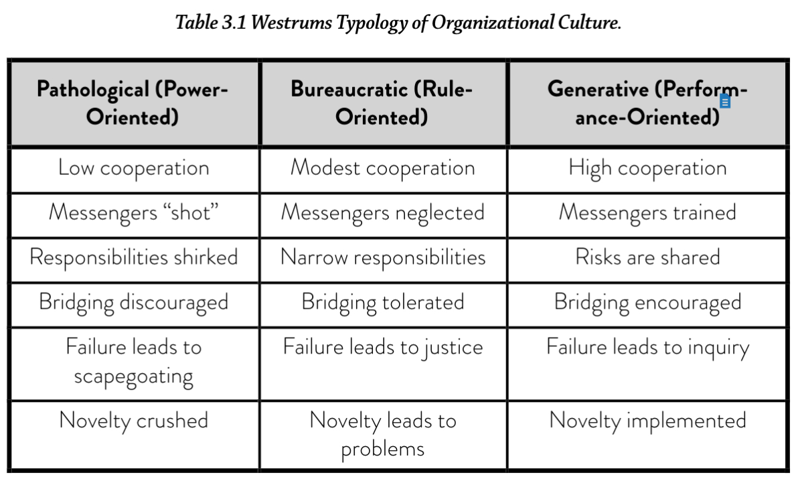This image, from Imagine That Things Can Be Different which in turn got it from the book Accelerate!, touches on an issue that has been on my mind quite a bit over the past few years.

In a more accessible format:
| Pathological (power-oriented) |
Bureaucratic (rule-oriented) |
Generative (performance-oriented) |
|---|---|---|
| Low cooperation | Modest cooperation | High cooperation |
| Messengers "shot" | Messengers neglected | Messengers trained |
| Responsibilities shirked | Narrow responsibilities | Risks are shared |
| Bridging discouraged | Bridging tolerated | Bridging encouraged |
| Failure leads to scapegoating | Failure leads to justice | Failure leads to inquiry |
| Novelty crushed | Novelty leads to problems | Novelty implemented |
Most organisations that are on the left-hand side─pathological─think they are on the right-hand side─generative─or at the very least bureaucratic well on its way towards incrementally improving itself towards a performance culture.
It’s a variation on the Dunning-Kruger effect, where people who have no knowledge or skill in a field vastly over-estimate their own capabilities. These organisations lack the skills to accurately gauge their capabilities─they lack the very thing that they need to be able to position themselves accurately in this table. Their communications are either top-down orders or backchannel gossip and collaboration and cooperation is next to non-existent.
I don’t know if it’s possible to ‘fix’ an organisation that is stuck on the left-hand side of this table. Remember, ‘power-oriented’ in this context isn’t a matter of financial power or capital but organisational power and social capital. Which means that the people who benefit the most from the status quo are the only ones who have the resources to change it. Which would mean giving up power.
And I’ve never seen anybody voluntarily give up power in an organisation like that.